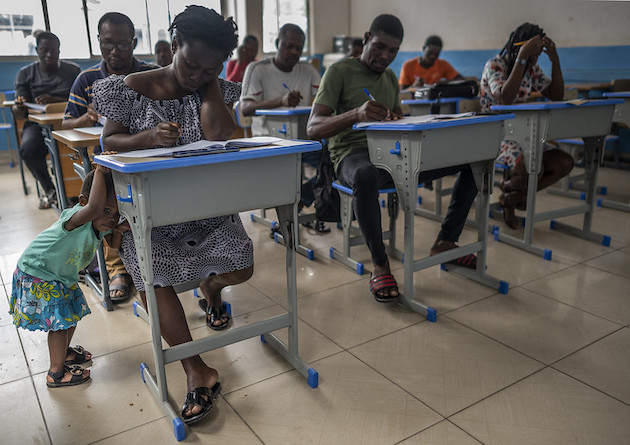Summary:
-
Many MPs have pledged their support for family life education and teenage reproductive health and rights.
-
IPS: The maternal mortality rate in Ghana is declining.
-
A non-governmental organisation called the Asian Population and Development Association (APDA) was founded in Japan to tackle the problems brought on by population and development-related issues.
-
It acts as the JPFP’s secretariat and concentrates on the function of Japanese MPs and their counterparts in Asia, Africa, the Arab world, and other regions.
-
Under the ICPD 25 subject areas, APDA frequently hosts conferences across Asia, Africa, and the Middle East.

In addition, Pelpuo, the president of the African Parliamentarians Forum on Population and Development, claimed that it was now “normal practise” for lawmakers to support young people and “lead discussions on family planning and adolescent reproductive health at youth sensitization programmes.”
He told IPS. “Our shared interest in, commitment to, and existing cooperation on population and development issues like sexual and reproductive health and rights, including family planning and HIV/AIDS,” the presidents of the Pan African Parliament (PAP) and the African Parliamentarians Forum on Population and Development (APPFD) acknowledge. A memorandum of understanding, including this pledge, is anticipated to be signed in 2023.

Here are some quotes from the conversation:
IPS: Even though Ghana’s Constitution and Children’s Act both forbid child marriage, 1 in 5 girls and 1 in 20 women are married before 18 and 20, respectively. The northern regions are where these unions are more frequent.
How are lawmakers handling these problems?
RP: The problem of child marriage in Ghana can be traced to a long-standing custom of marrying girls before they become “spoiled” because doing so would shame the family who raised them. Even though this circumstance is no longer present, early marriage for women is still common, particularly in rural Ghana.
Both inside and outside Parliament, members of the Population and Development Caucus and others are adamantly opposed to this practice.
The Children’s Act and the Ghanaian Constitution of 1992 prohibit marrying a girl before she turns 18. In a few instances where a man marries a girl before the legal age or even before she has completed her primary schooling, MPs would typically work with law enforcement to release the girl and aid in the prosecution of the offender.
Many MPs have pledged their support for family life education and teenage reproductive health and rights. To contact young people and solve their health and educational difficulties through referrals, MPs have collaborated with the United Nations Population Fund (UNFPA) in significant places just this year.
IPS: About 30% of Africa’s population resides in West Africa. By 2035, the population is projected to grow from about 367 million to about 570 million. However, the “demographic dividend” has yet to be felt. A large youth population is reportedly tricky for the government to manage because of the high costs of health care, education, and other services, as well as the high unemployment rate. How are lawmakers striving to improve family planning, education, and other policies that could lower fertility rates?
According to the Ghana Statistical Service, 2022, the fertility rate in Ghana is 3.696 births per woman, compared to Africa’s fertility rate of 4.212 babies per woman. Since 1985, Ghana’s fertility rate has been steadily falling; in 2025, it is predicted to be 2.9 births per woman. Parliamentarians frequently engage with young leaders and reproductive health specialists to educate the public about unplanned pregnancies and how to prevent them.
For instance, in November of last year, MPs spoke with young people about reproductive health issues. Additionally, MPs convened a workshop with UNFPA support at the beginning of December 2022 to discuss the effects of Ghana having an 8 billion-person world on the occasion of the birth of the world’s 8 billionth kid.
The MPs promised to change their annual advocacy on Ghana’s population increase and problems to quarterly advocacy through statements on the floor of Parliament after that programme. MPs’ efforts to encourage youth education and awareness focus on advocating for policies and working directly with young people. At youth sensitization programmes, MPs now frequently take the lead in conversations about family planning and teen reproductive health issues.
The Asian Population and Development Association (APDA) and the UNFPA frequently fund the African Parliamentarians Forum, which focuses on family planning, reproductive health, and universal health issues. This appears to be a direct reaction to sub-Saharan Africa’s high fertility rate of 4.6 children per woman (World Bank Report, 2021). It has become vital to make a case for policy advocacy in these areas for all African countries, given the prevalence of adolescent pregnancy and unplanned births across the continent.
Parliamentarians acknowledged “our shared interest in, commitment to, and existing cooperation on population and development issues such as sexual and reproductive health and rights, family planning, and HIV/AIDS” in a memorandum that the presidents of the Pan African Parliament and the African Parliamentarians Forum on Population and Development have yet to sign.
IPS: The maternal mortality rate in Ghana is declining. Online statistics state that it is 308 per 100,000. Other nations in the region have significantly higher rates; Nigeria, Ghana’s neighbour, has a rate of 917/100,000. Even though both appear to be declining (which is excellent), they are still far from the 70/100,000 SDG 3 targets. What are lawmakers in Ghana trying to change to make this better? Is this being addressed through regional cooperation?
RP: To address the issue of Ghana’s unacceptably high maternal mortality rate, legislators frequently confront the ruling administration in policy pronouncements on maternal health. Our health policies place a high priority on maternal mortality issues. Ghana has implemented the Free Maternal Health Care Policy (FMHCP), which entitles pregnant women to free medical attention and registration for health insurance. In creating this policy, legislators served as advocates and have been contacting women who may not be aware of it to assist them in utilising it. The impact has been highly favourable, as seen by the yearly gains in maternity health.
Regional collaborations have been to discuss and exchange information on reproductive health and rights and universal health care. With their colleagues from other regions, particularly the Asian and European Parliamentarians Forums, the African Parliamentarians Forum has held several meetings and conferences focused on policy sharing and issues related to reproductive health. In numerous worldwide conferences addressing high maternal mortality problems, significant maternal health cooperation has been documented. These conferences include Women Deliver (Africa Parliamentarians), held in Vancouver, Canada, in June 2019, and Partnership for Maternal, Newborn, and Child Health (PMNCH), born in New Delhi, India, in December 2018. These collaborative spaces help us compare the approaches taken by various nations and areas to reproductive health problems.
IPS: Could you provide more information on how the APDA supports regional cooperation on the ICPD25 programme of action?
A non-governmental organisation called the Asian Population and Development Association (APDA) was founded in Japan to tackle the problems brought on by population and development-related issues. It acts as the JPFP’s secretariat and concentrates on the function of Japanese MPs and their counterparts in Asia, Africa, the Arab world, and other regions. The three core topics of APDA’s research are gender, health, and social policy challenges. Since ICPD 25 was designated as an intervention area, APDA has arranged several programmes.
Under the ICPD 25 subject areas, APDA frequently hosts conferences across Asia, Africa, and the Middle East. Various MPs from Asia, Africa, the Americas, and Europe often attend these conferences to discuss significant population and development issues. At the meetings, topics like young unemployment and other ICPD25 objectives take a prominent stage.
The UNFPA and APDA do work together to conduct conferences on ICPD25 every year. Recently, APDA has scheduled seminars and webinars for June, July, and September 2022 with regional participation.
Asian and African parliamentarians attended the conference in September 2022 with the subject “The Role of Parliamentarians in Realizing the ICPD25 Commitments.”
In June 2022, a second follow-up meeting on the ICPD25 Commitments occurred in Addis Abeba, Ethiopia. It was funded by the International Planned Parenthood Federation in conjunction with UNFPA ESARO and the Japan Trust Fund (JTF) (IPPF). Parliamentarians, officers of national population and development committees, and UN experts were among the more than 100 attendees.
In practice, APDA has always backed the ICPD25’s implementation in several ways, primarily through international conferences that guarantee regional cooperation and involvement.

